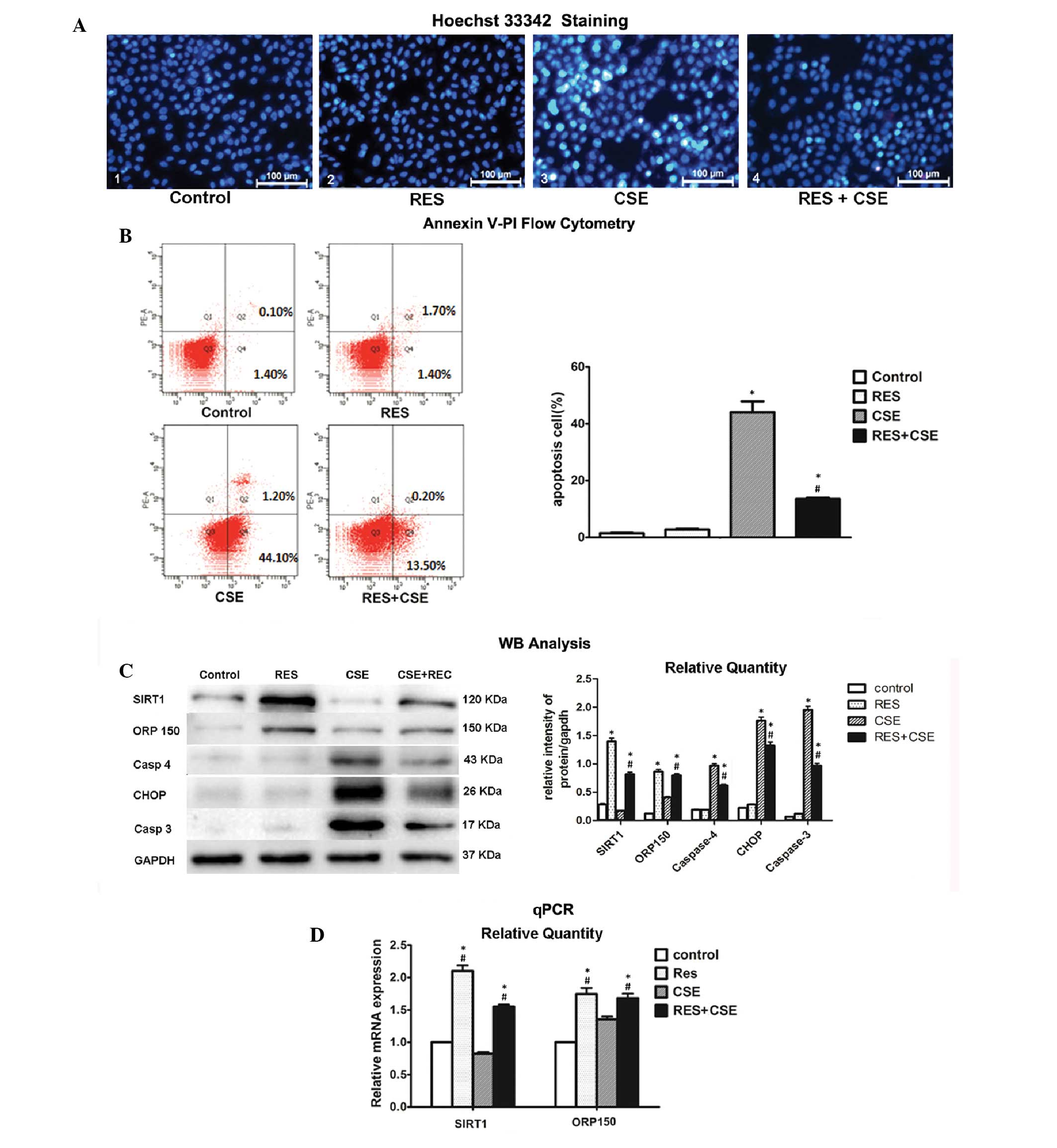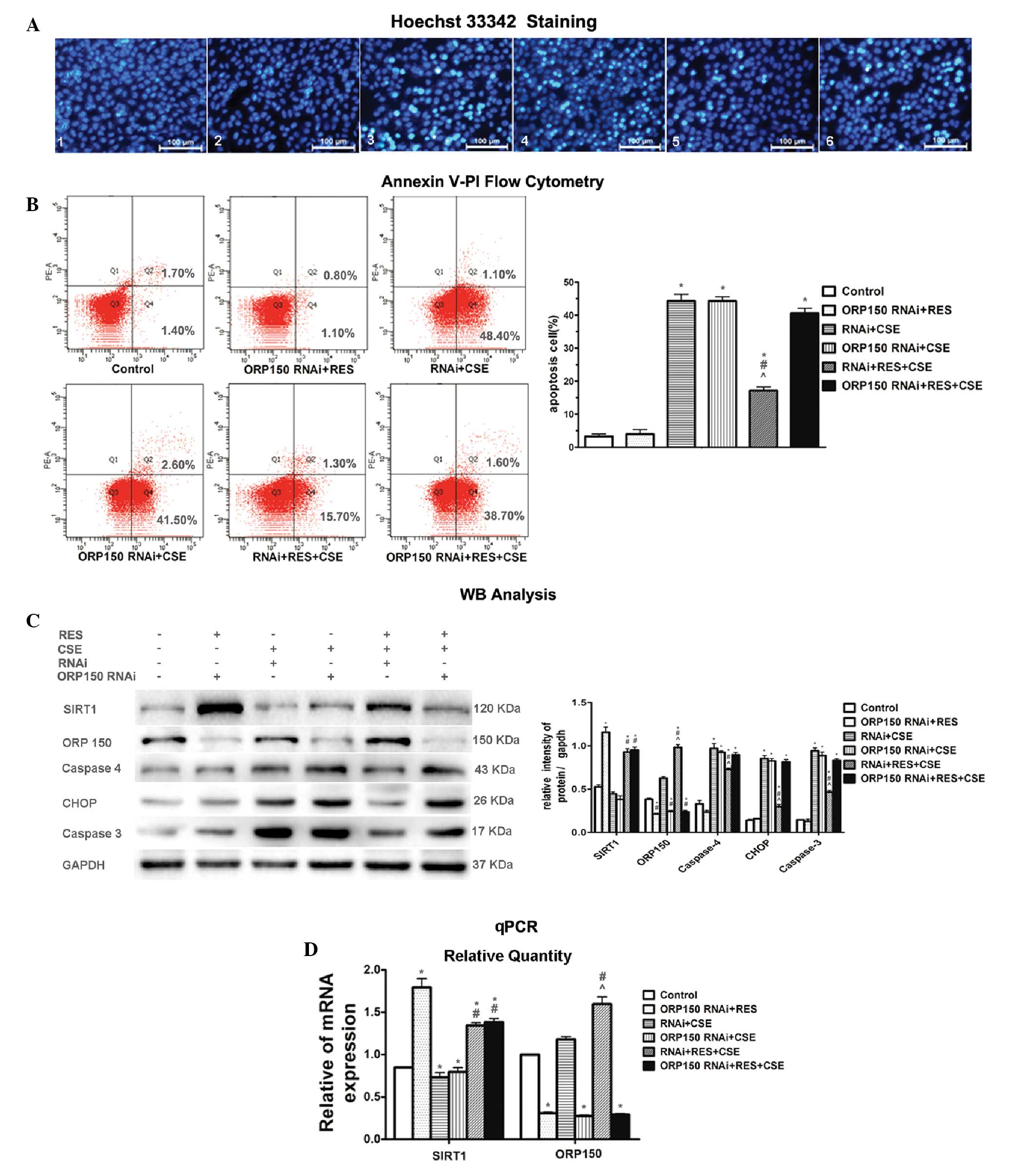|
1
|
Pauwels RA and Rabe KF: Burden and
clinical featuRES of chronic obstructive pulmonary disease (COPD).
Lancet. 364:613–620. 2004. View Article : Google Scholar : PubMed/NCBI
|
|
2
|
Demedts IK, Demoor T, Bracke KR, Joos GF
and Brusselle GG: Role of apoptosis in the pathogenesis of COPD and
pulmonary emphysema. RESpir RES. 7:532006. View Article : Google Scholar : PubMed/NCBI
|
|
3
|
Kuwano K: Epithelial cell apoptosis and
lung remodeling. Cell Mol Immuno. 4:419–429. 2007.
|
|
4
|
Kelsen SG, Duan X, Ji R, Perez O, Liu C
and Merali S: Cigarette smoke induces an unfolded protein RESponse
in the human lung: a proteomic approach. Am J RESpir Cell Mol Biol.
38:541–550. 2008. View Article : Google Scholar
|
|
5
|
Kim I, Xu W and Reed JC: Cell death and
endoplasmic reticulum stRESs: disease relevance and therapeutic
opportunities. Nat Rev Drug Discov. 7:1013–1030. 2008. View Article : Google Scholar : PubMed/NCBI
|
|
6
|
Rahman I, Kinnula VL, Gorbunova V and Yao
H: SIRT1 as a therapeutic target in inflammaging of the pulmonary
disease. Prev Med. 54:S20–S28. 2012. View Article : Google Scholar :
|
|
7
|
Lagouge M, Argmann C, Gerhart-Hines Z, et
al: Resveratrol improves mitochondrial function and protects
against metabolic disease by activating SIRT1 and PGC-1alpha. Cell.
127:1109–1122. 2006. View Article : Google Scholar : PubMed/NCBI
|
|
8
|
Wood JG, Rogina B, Lavu S, et al: Sirtuin
activators mimic caloric REStriction and delay ageing in metazoans.
Nature. 430:686–689. 2004. View Article : Google Scholar : PubMed/NCBI
|
|
9
|
Chen CJ, Yu W, Fu YC, Wang X, Li JL and
Wang W: Resveratrol protects cardiomyocytes from hypoxia-induced
apoptosis through the SIRT1-FoxO1 pathway. Biochem Biophys RES
Commun. 378:389–393. 2009. View Article : Google Scholar
|
|
10
|
Csiszar A, Labinskyy N, Podlutsky A, et
al: Vasoprotective effects of Resveratrol and SIRT1: attenuation of
cigarette smoke-induced oxidative stRESs and proinflammatory
phenotypic alterations. Am J Physiol Heart Circ Physiol.
294:H2721–H2735. 2008. View Article : Google Scholar : PubMed/NCBI
|
|
11
|
Anekonda TS and Adamus G: Resveratrol
prevents antibody-induced apoptotic death of retinal cells through
upregulation of Sirt1 and Ku70. BMC RES Notes. 1:1222008.
View Article : Google Scholar : PubMed/NCBI
|
|
12
|
Liu LQ, Fan ZQ, Tang YF and Ke ZJ: The
Resveratrol attenuates ethanol-induced hepatocyte apoptosis via
inhibiting ER-related caspase-12 activation and PDE activity in
vitro. Alcohol Clin Exp RES. 38:683–693. 2014. View Article : Google Scholar
|
|
13
|
Yao H, Chung S, Hwang JW, et al: SIRT1
protects against emphysema via FOXO3-mediated reduction of
premature senescence in mice. J Clin Invest. 122:2032–2045. 2012.
View Article : Google Scholar : PubMed/NCBI
|
|
14
|
Rajendrasozhan S, Yang SR, Kinnula VL and
Rahman I: SIRT1, an antiinflammatory and antiaging protein, is
decreased in lungs of patients with chronic obstructive pulmonary
disease. Am J Crit Care Med. 177:861–870. 2008. View Article : Google Scholar
|
|
15
|
Tagawa Y, Hiramatsu N, Kasai A, et al:
Induction of apoptosis by cigarette smoke via ROS-dependent
endoplasmic reticulum stRESs and CCAAT/enhancer-binding
protein-homologous protein (CHOP). Free Radic Biol Med. 45:50–59.
2008. View Article : Google Scholar : PubMed/NCBI
|
|
16
|
Wu YB, Li HQ, Ren MS, Li WT, Lv XY and
Wang L: CHOP/ORP150 ratio in endoplasmic reticulum stress: a new
mechanism for diabetic peripheral neuropathy. Cell Physiol Biochem.
32:367–379. 2013. View Article : Google Scholar : PubMed/NCBI
|
|
17
|
Jung TW, Lee KT, Lee MW and Ka KH: SIRT1
attenuates palmitate-induced endoplasmic reticulum stRESs and
insulin RESistance in HepG2 cells via induction of oxygen-regulated
protein 150. Biochem Biophys RES Commun. 422:229–232. 2012.
View Article : Google Scholar : PubMed/NCBI
|
|
18
|
Kusaczuk M and Cechowska-Pasko M:
Molecular chaperone ORP150 in ER stRESs-related diseases. Curr
Pharm Des. 19:2807–2818. 2013. View Article : Google Scholar : PubMed/NCBI
|
|
19
|
Wang Y, Wu Z, Li D, et al: Involvement of
oxygen-regulated protein 150 in AMP-activated protein
kinase-mediated alleviation of lipid-induced endoplasmic reticulum
stRESs. J Biol Chem. 286:11119–11131. 2011. View Article : Google Scholar : PubMed/NCBI
|
|
20
|
Braber S, Koelink PJ, Henricks PA, et al:
Cigarette smoke-induced lung emphysema in mice is associated with
prolyl endopeptidase, an enzyme involved in collagen breakdown. Am
J Physiol Lung Cell Mol Physiol. 300:L255–L265. 2011. View Article : Google Scholar :
|
|
21
|
Yuan T, Luo BL, Wei TH, Zhang L, He BM and
Niu RC: Salubrinal protects against cigarette smoke extract-induced
HBEpC apoptosis likely via regulating the activity of PERK-eIF2α
signaling pathway. Arch Med RES. 43:522–529. 2012. View Article : Google Scholar : PubMed/NCBI
|
|
22
|
Xiong XL, Jia RH, Yang DP and Ding GH:
Irbesartan attenuates contrast media-induced NRK-52E cells
apoptosis. Pharmacol RES. 54:253–260. 2006. View Article : Google Scholar : PubMed/NCBI
|
|
23
|
Tagawa Y, Hiramatsu N, Kato H, et al:
Induction of CCAAT/enhancer-binding protein-homologous protein by
cigarette smoke through the superoxide anion-triggered PERK-eIF2α
pathway. Toxicology. 287:105–112. 2011. View Article : Google Scholar : PubMed/NCBI
|
|
24
|
He B, Luo B, Chen Q and Zhang L: Cigarette
smoke extract induces the expression of GRP78 in A549 cells via the
p38/MAPK pathway. Mol Med Rep. 8:1683–1688. 2013.PubMed/NCBI
|
|
25
|
Hodge S, Hodge G, Holmes M and Reynolds
PN: Increased airway epithelial and T-cell apoptosis in COPD
remains despite smoking cessation. Eur Respir J. 25:447–454. 2005.
View Article : Google Scholar : PubMed/NCBI
|
|
26
|
Tagawa Y, Hiramatsu N, Kasai A, Hayakawa
K, Okamura M, Yao J and Kitamura M: Induction of apoptosis by
cigarette smoke via ROS-dependent endoplasmic reticulum stress and
CCAAT/enhancer-binding protein-homologous protein (CHOP). Free
Radic Biol Med. 45:50–59. 2008. View Article : Google Scholar : PubMed/NCBI
|
|
27
|
Yao H, Chung S, Hwang JW, Rajendrasozhan
S, Sundar IK, Dean DA, McBurney MW, Guarente L, Gu W, Rönty M, et
al: SIRT1 protects against emphysema via FOXO3-mediated reduction
of premature senescence in mice. J Clin Invest. 122:2032–2045.
2012. View
Article : Google Scholar : PubMed/NCBI
|
|
28
|
Malhotra D, Thimmulappa R, Vij N, et al:
Heightened endoplasmic reticulum stRESs in the lungs of patients
with chronic obstructive pulmonary disease: the role of
Nrf2-regulated proteasomal activity. Am J RESpir Crit Care Med.
180:1196–1207. 2009. View Article : Google Scholar : PubMed/NCBI
|
|
29
|
Tanel A, Pallepati P, Bettaieb A, Morin P
and Averill-Bates DA: Acrolein activates cell survival and
apoptotic death RESponses involving the endoplasmic reticulum in
A549 lung cells. Biochim Biophys Acta. 1843.827–835. 2014.
|

















